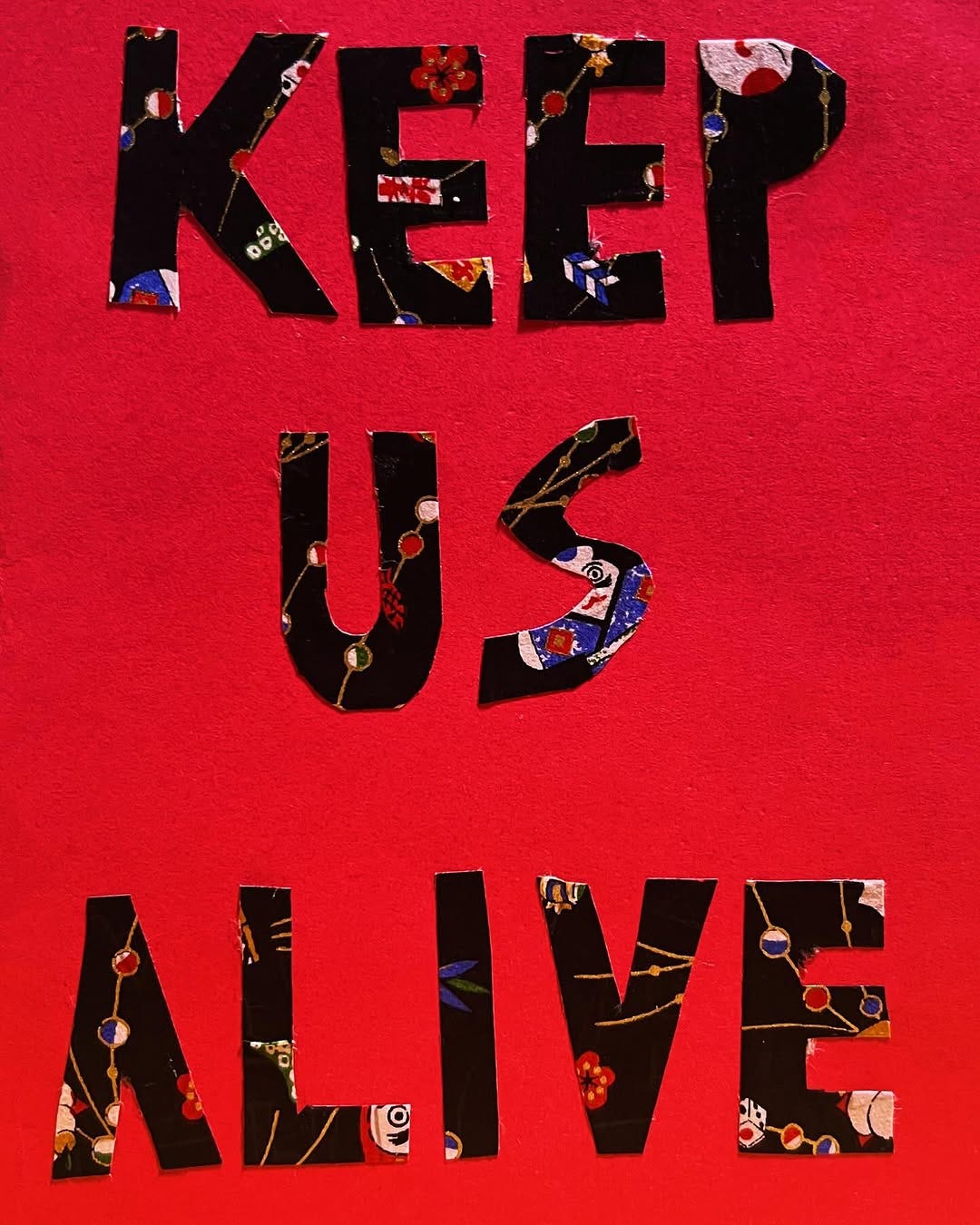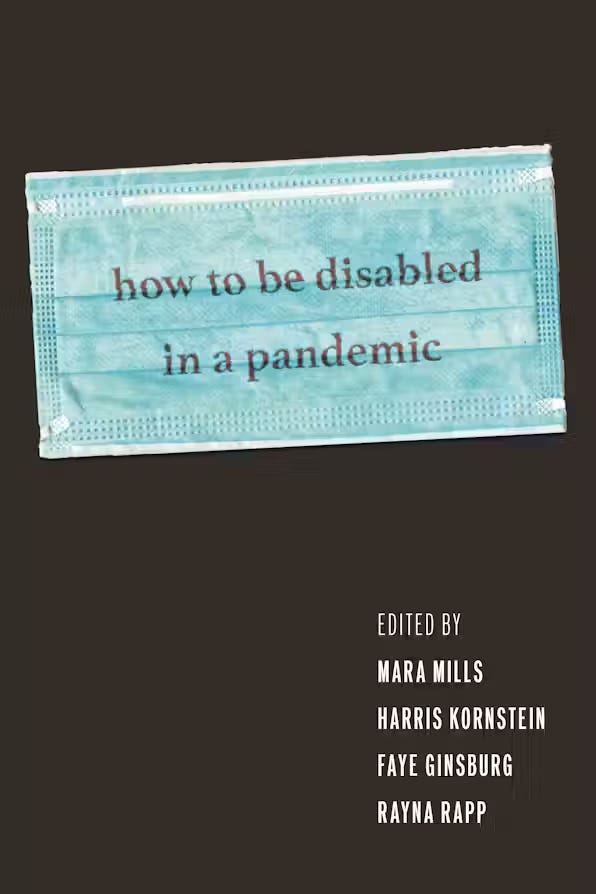Crip News v.173
New works, other news, calls, events, and a profile of a true villain, Leland Dudek.
NEWS
New Works
Next week, the Health Justice Commons will kick off a series called Understanding and Transforming the Medical Industrial Complex Part 2: Climate and Disability Justice Edition. For weeks, HJC’s newsletter has been offering analysis of recent news as an introduction to the framework of the series, offering political education on the way to political education. Note: You don’t need to have taken Part 1 to enroll in Part 2.
Cornell University’s Yang-Tan Institute on Employment and Disability has released new kinds of disability data using information from the Census Bureau.
How to Be Disabled in a Pandemic, edited by Mara Mills, Harris Kornstein, Faye Ginsburg, and Rayna Rapp, is out from NYU Press with a free, open-access digital version.
Starting this week, the UK’s DaDaFest International celebrates its 40th anniversary with a packed hybrid program called RAGE: A Quiet Riot. “From the internal quiet frustrations and righteous rage to overt injustice and activism,” the organizers write, “DDFI40 will explore disability rights, disability arts, access, ableism and ‘Rage’ in an explosion of creativity.”
In an interview with The New York Times, writer Ed Yong explains how he pushes back on pandemics’ “panic-neglect cycle”: ”Every time I do a talk, while the vast majority of people in the audience have probably moved on, there are going to be other people who haven’t. I think it makes a huge difference to them to have the person at the front of the stage wear a mask. It tells them, It’s not weird.”
Unlimited recently published a short film by artist Suzie Cross documenting the creation of artist Mohammad Barrangi‘s mural at Pinderfields Hospital.
Rebecca Williford, President & CEO of Disability Rights Advocates, recently penned an article in Able News explaining the organization’s litigation to secure disabled people’s right to shelter.
Writer Kelly Mack recently wrote about the interwoven narratives of normal disabled characters in Netflix series Loudermilk, created by Peter Farrelly and Bobby Mort.
In Other News…
John McFall, a disabled British surgeon and Paralympian, has been cleared to serve a 6-month mission to the International Space Station.
CALLS
New Disabled South’s Black Disability Institute is collecting stories for its Black Disability Anthology Series.
The National Alliance of Melanin Disabled Advocates (NAMED Advocates) is hiring an Education & Programs Manager.
South Arts is accepting applications for round 2 of its $2,500 Accessibility Grants for organizations to make arts programs accessible to persons with disabilities. Apply by March 5.
FINAL WEEK TO APPLY: Labs for Liberation has announced the Summer Institute on Disability and Design, a 6-week program with a public lecture series and immersive design labs. Applications for paid participation in the design labs are open until March 7.
StopGap Foundation is recruiting a Board Chair.
New Disabled South is hiring an HR & Operations Assistant. Interviews begin in April.
Unlimited UK is hiring a Programme Officer and a Programme Associate. Apply by March 10.
The Inevitable Foundation is accepting applications for the Accelerate Fellowship, a six-month rewriting sprint that gives disabled film and television writers $40,000 in funding and bespoke mentorship to develop a spec script that incorporates disability into the DNA of the project. Apply soon.
I’m Heard is seeking autistic individuals for its Project Pebbles survey.
Applications from disabled high school seniors are open for the Microsoft Disability Scholarships. Apply by March 13.
EVENTS
Christine Sun Kim: Deaf Death
Thursday, Mar. 13, 6:30pm, in-person at the Whitney Museum (NYC) and on Zoom
For this Walter Annenberg Lecture, Kim presents a lecture-performance that explores the tendency of text programs to autocorrect the word “deaf” to “death.” Using images and incisive commentary, Kim questions what defines disability, and how different definitions reflect fears and hopes for the future. A conversation between Kim and Scott Rothkopf, Alice Pratt Brown Director follows the presentation.
Screening: Por donde pasa el silencio
Wednesday, Mar. 5, 7pm ET, in-person at NYU (NYC)
We are thrilled to screen Por donde pasa el silencio, nominated for Best New Director at the Goya Awards, followed by a discussion with the film’s director, Sandra Romero. Post-screening discussion about disability, autonomy and care with filmmaker Sandra Romero and authors Rachel Adams (Columbia University) and Aurélie Vialette (Yale University). Film in Spanish with English subtitles. Post-film discussion in English, with bi-lingual (Spanish-English discussion).
Network for Accessibility, Performing Arts, and Disaster Preparedness Listening Session
Monday, Mar. 10, 2 - 4pm ET, in-person in Bethesda, MD and online
Come tell your story, meet others exploring the connections between accessibility and safety, and help shape actionable strategies to enhance performing arts spaces. Whether you are an artist, audience member, arts administrator, accessibility worker, venue staff, event planner, or festival director, your voice matters.
Brooklyn Art Exchange’s Accessible Annex Space Open House
Saturday, Mar. 8, 12 - 4pm ET (with socializing until 5pm), in-person at 80 Hanson Place (Brooklyn)
Join us for an afternoon of creativity, community, and celebration as we open the doors to BAX’s brand-new accessible Annex Space! This exciting event follows our inaugural ASSEMBLE convening on disability artistry (curated by BAX AIR Elisabeth Motley and in collaboration with Jacob’s Pillow) and invites you to explore, connect, and create.
ABC’s of Grassroots Organizing Zoom Training
Thursday, Mar. 6, 2 - 4pm MT, on Zoom
Join ADAPT for a training on the basics of grassroots organizing.
Long Term Supports and Services 4 All (LTSS4ALL) Telling Your Story Workshop
Friday, Mar. 7, 12 - 1pm PT, on Zoom
With Medicaid cuts on the line, advocacy matters more than ever! Our stories move decision-makers, shift policies, and protect the care of our communities. Join the LTSS4All Grassroots Coalition for a Storytelling Workshop! Together, we’ll get an update on Medicaid and Long-Term Supports and Services (LTSS), learn tips on how to share our stories in meetings with lawmakers, and support each other in writing and practicing in a welcoming space. This workshop will not be recorded, but there will be more chances to join in the future.
VILLAIN PROFILE: LELAND “LEE” DUDEK
Quick background: In 2023, I learned something from Minnesota-based Minister JaNaé Bates that changed how I talk about ableism. “If you think about the greatest story you’ve ever heard,” she said, “I bet you there is a protagonist who is bomb diggity and there is a villain. And [the villain] is not the air.” When we say that our problem is a huge system like the medical industrial complex, it can make people feel like there’s nothing we can do. So today (and maybe in a recurring Villain Profile series?), we’re looking at a specific actor in the US federal government’s ableist machinery.
In the span of 3 days last month, a worker at the US Social Security Administration (SSA) named Leland Dudek went from being on administrative leave from a mid-level role with no supervision duties to becoming the Acting Commissioner who now leads the agency’s 57,000 employees.
Dudek was one of the first people to help the so-called Department of Government Efficiency (DOGE) gain access the SSA. Most of the press coverage about him has stopped there, but anyone who cares about the near future of disability benefits should be interested in going deeper on what his ascendence might portend.
Before he boasted about bullying executives and circumventing his chain of command to help DOGE, Dudek was an adviser in the SSA’s Office of Program Integrity (OPI). If we look closely at this office’s “centralized oversight” and “accountability” duties, we find that this isn’t just any ol’ office at the SSA:
OPI is responsible for the SSA’s “continuing disability reviews” and “non-medical redeterminations.” This is how the agency verifies people’s disability status and determines if someone exceeds the punitive income and asset limits to remain eligible for support. In other words, these are the cops who enforce poverty on millions of disabled people in the US.
It’s also where the SSA carries out its anti-fraud operations, which have receiving an increasing share of reallocated funds in recent years for collaborative investigations across federal, state, and local agencies.
And now, OPI is expanding. In one of his first announcements, Dudek said the functions of OPI’s parent office will spread out into existing parts of the agency to consolidate management, increase data sharing, and identify more fraud. (Dudek also eliminated the supposedly “redundant” Office of Civil Rights and Equal Opportunity and the “wasteful” Office of Transformation, which maintains the agency’s website and had been tasked with an IT overhaul that has been a top priority for the SSA for years.)
What’s next? I’ll venture 2 guesses:
Dudek will take over the SSA’s Office of Inspector General when the Senate gets around to confirming Trump’s pick for the longer-term Commissioner. The Inspector General is meant to be an independent and objective oversight body within the SSA. It reports on the agency’s funding to Congress each year (right about this time of year). It’s also where the SSA has been looking into how AI could streamline the agency’s work, which has been disastrous in similar systems. We might expect the Inspector General’s office to lose its autonomy as it becomes key to making the case that AI will save the SSA huge amounts of money.
Dudek will be prosecuted for his actions. In helping DOGE (including sharing key information with a vile 25-year-old Musk lackey who proudly tweeted that he was racist “before it was cool” and wants a “eugenic immigration policy”), he may have opened the door to external access of Numident records, some of the most sensitive personal information the government holds (including mothers’ maiden names, a common element in identity verification). Unauthorized release of Social Security data is a crime punishable “by a fine of up to $1,000 and/or 1 year imprisonment.”
For decades, scholars have tried to understand disability within the politics of identity. Now we can understand how a special kind of villain like Leland Dudek is deciding it for us: identity politics - the politicization of the elemental features of a disability identity - is now more direct and harmful than ever, affecting everyone’s disabled futures.












Thank you Kevin, for everything you do and do so well with these bulletins. |
I like that you are calling out particular "villains" like Leland Dudek. He may be misguided, ignorant or honestly doing what he thinks is right but he is putting many lives at risk, including my own. I am afraid of him. His arrogance, at the least, needs to be shouted out. When you point us to this particular guy, I feel that others in the disability community have my back - I am no longer alone in my fear.
I also love the wonderful poster at the end. It's perfect. Thanks to the artist, Jillian Crochet. And, to you.
Thanks so much for the villain profile! Here’s how all this info will get used - if you can remove people from SSI, you can remove them from Medicaid. It’s a great cost savings when you deny people the services they need to survive. I just wrote about this; feel free to share. New reader but I love your blog already!!
https://time.com/7260543/medicaid-work-requirements-disability-essay/